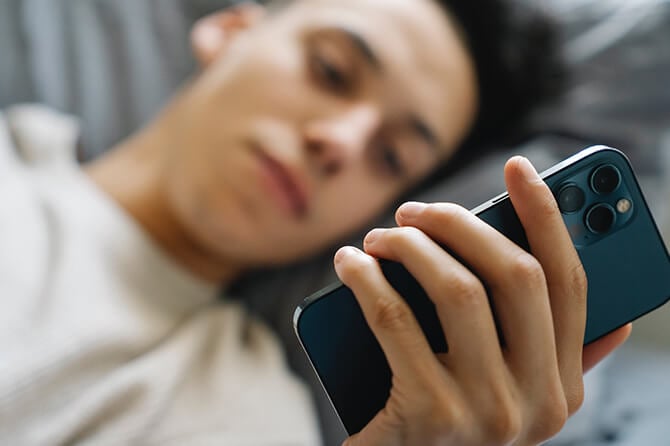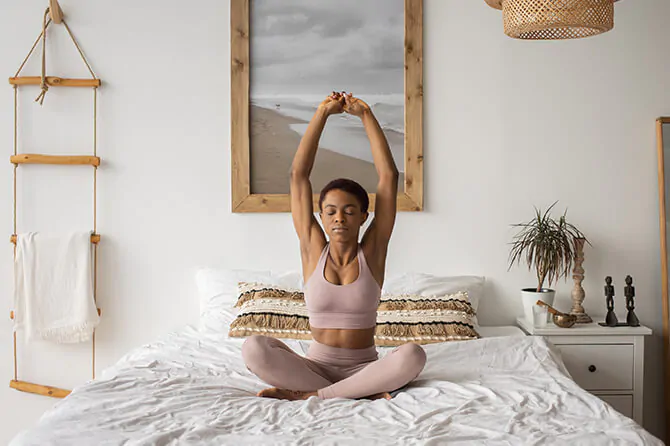
The 12 Most Utilised Tips to Fall Asleep
Let's be honest, we've all experienced the frustration of trying to get to sleep. So we've turned directly to you for your tried-and-tested tricks for aiding yourself to sleep and compiled a list of the most used. Give them a go!
Tossing. Turning. Waking. Checking your phone. Tossing. Turning. Waking. Trudging to the bathroom. Tossing. Turning. Waking. And on. And on. And on.
Sound familiar? Not surprising, considering that approximately 36% of people in the UK regularly struggle to snag a full night’s sleep.
But as we know, consistently getting enough shuteye is essential to your health and well-being, and sleep deprivation is associated with everything from depression to diabetes, and even permanent damage to your brain.
So, in the interest of helping you case those much-needed zzzs, we’ve consulted the social hivemind (Instagram and Tik Tok) and compiled a list of the most-used tips for falling asleep. Some you’d expect; others will surprise you.
So, if you’re having trouble getting to sleep, who knows? Maybe you’ll find a new trick (or twelve) to help.
How to Get to Sleep: By You
As noted, we’re here as messengers; sharing trending sleep tips in the hope that you’ll pick up another tip to add to the nightly arsenal.
So, your mileage may vary, but we’re positive you’ll find something to suit your slumber style. Ready? Let’s do it.
1. Attachment Parenting
Parents: you may not be getting enough sleep (sorry, goes with the territory) but that doesn’t mean your little one(s) are equally doomed to wakefulness – especially if you’re willing to give attachment parenting a try.
The softer, more well… attached cousin of the emotionally demanding Ferber Method, attachment parenting is a technique that prioritises emotional stability through techniques such as touch and understanding.
But how does it work?
Essentially, attachment parenting – in the context of sleep – focuses on immediate responsiveness when your baby cries, followed by soothing centred on physical touch.
So, if your little one wakes up (again!?) you immediately flick on the bedside lamp and head to their room to offer comfort and cuddles, before setting them back down to sleep; repeating the process each time they wake.
Demanding? Yes. Useful? You’ll have to tell us.

2. Sleeping with a Weighted Blanket
As the name implies, weighted blankets are heavier than the regular kind, and they’re often suggested for people struggling with insomnia or anxiety.
But why? Well, sleeping beneath a weighted blanket takes inspiration from a therapeutic technique known as deep pressure stimulation, which uses controlled pressure to induce calm – not unlike the feeling of security infants feel with swaddled.
The benefits of sleeping beneath a weighted blanket include:
- Improved sleep quality
- Reduction in stress
- Overall calming effect
3. Wearing Blue Light Glasses
Our lives are dominated by screens. Whether computer monitors for work, TV screens for gaming, or smartphones for literally everything, we’re almost always fixated on one screen or another.
And where there are screens, there’s blue light. And where there’s blue light, there’s a risk of sleeplessness. But what is blue light, and how does it impact your sleep?
Blue light comes from the sun. And, during the day, it can help you stay alert and offers up a mood boost. The problem, however, stems from the fact that screen-based technology also emits blue light, which inhibits the production of melatonin; a hormone that helps you to fall asleep.
So, how do blue light glasses work?
If you’re around screens a lot. Like…. A lot. Blue light glasses help to filter out the blue light emitted by those screens, meaning the production of melatonin isn’t impacted, meaning your sleep isn’t affected.
It’s not an exact science – and there’s no better remedy for blue light than simply avoiding screens before bedtime – but blue light glasses are evangelised by tens of thousands of people.

4. Beauty Sleep
Disclaimer: we’re aware that ‘beauty sleep’ isn’t a tip to fall asleep. We’re reporting the news here, not making it!
That said, this entry speaks to consistency. And sleep hygiene. Indeed, beauty sleep typically refers to the blissful, rejuvenating type of slumber, not the fragmented, staccato sleep reported by millions.
You see, getting beauty sleep isn’t just ‘a good night’s rest.’ It’s a self-care issue. It’s prioritising you forty winks. It’s using ‘beauty products’ such as bath salts, oils, or soaks to prepare your body for sleep – especially products infused with ingredients such ylang ylang, valerian root, and lavender.
Not the soak-in-the-tub type? No matter. There are plenty of body washes and lotions that’ll hit the same sleep zone.
You might also try herbal extracts like passionflower, which have been used in sleep studies and have been directly linked to improved sleep quality and duration.
5. Using a Pillow Spray
A little aromatherapy for you now.
If you struggle to drift off (and are partial to pleasing scents) you might try weaving pillow mists into your nightly sleep routine. Known to boost both the quality and quantity of sleep you get; pillow sprays have become increasingly popular over the past several years.
Typically made from essential oils, pillow mists can ease stress and anxiety, allowing your mind and body to decompress from the day and unwind for a restful night’s sleep.
But do they work? Like… really? Short answer: yes. mostly.
Research has shown that certain aromas encourage our bodies to produce that all-important sleep hormone, melatonin and that scents such as lavender, vetiver, chamomile and frankincense provoke the most powerful response.
And they’re easy to use, too. Simply spray your pillow a few minutes before settling down for the night and breathe in the comforting and calming fragrance.
6. Maintaining a Sleep Routine
FYI: We’d have placed this firmly in the number one spot, but those aren’t the rules. We’re sticklers for a sleep routine.
And it’s easy to see why. Our bodies have a regulatory system, known as the circadian rhythm. Sound complex? Not so. Think of it as a sort of… internal clock that cues us to feel awake during the day and tired at night.
The snag? Our circadian rhythms are easily disrupted by external factors (blue light being one such culprit, daylight saving time another), so it’s important to establish, and stick to, a sleep routine, with set times for going to bed at night and waking up in the morning.
It’s also wise to prepare to sleep. Meaning? Well, as noted, our brains love routine, so factoring in some ‘wind down’ time before bed can help signal to your brain that it’s almost time to sleep, helping you prepare for slumber.
And the more you do it, the more ingrained the routine will become, boosting the quality of sleep you get.
So, start small and try having 30 to 45 minutes of downtime in the evening before getting into bed, avoiding screen time. You might read a book. You might write in a journal. You may even take a soothing soak in a warm bath.
Whatever you do, no manner how simple, will help your body clock to predict when to induce sleep, leaving you feeling more rested and ready to wake up feeling bright-eyed and bushy-tailed.
We don’t know what that phrase really means, either. No one does.
7. Eating Bedtime Snacks
Full disclosure: we usually inveigh against eating too close to bedtime, so consider this the exception that proves the rule.
Also, there’s a difference between a three-course meal and a late-night snack, so don’t eat too much before settling down to sleep.
That said, there’s evidence to suggest that eating a small bedtime snack can help you catch some zzzs and that certain foods are partially useful for triggering sleepiness; with some helping to secure a deeper sleep.
What are these miracle sleep time snacks, you ask?
First-up, walnuts. Walnuts are a natural sleep aid as they contain melatonin, so consuming a small handful before bed can promote natural sleep. Ditto for certain breakfast cereals (the irony!) if drenched in warm milk, which contains known anti-insomnia agent, B12.
If you’d prefer something sweet before settling between the sheets, cherries (juiced or whole) can naturally boost your melatonin levels.
Snacks for sleep. Talk about living the dream.

8. Wearing a Sleep Mask
The sleep aid market is flooded with gadgets and gizmos designed to get you the sleep you need. Some work. Some don’t. As such, it’s always worth keeping a tried-and-tested sleep staple in your arsenal.
And they don’t come more tried-and-tested than sleep masks.
They’re not flashy. They’re not buzzing with pulse trackers, snore counters or thermometers, but they are effective. Not to mention cost-effective.
Sleep masks (or eye masks, if you prefer) work by blocking out external light, which is known to disrupt our internal clock. You see, exposure to artificial light suppresses the sleep-inducing hormone, melatonin, and can lead to being unable to drift off.
Wearing a sleep mask helps you to maintain your natural sleep cycle, acting as a shield against intrusive light and helping you get some well-earned shuteye.
9. Listening to Sleep Sounds
Babbling brooks. Night storms. Lapping waves. Some sounds just soothe us.
And it’s a soothing rooted in science, too. As research suggests that listening to comforting ambient noise as you settle down to drift off can help you fall asleep; and stay asleep once you’re settled in snooze-land.
And it isn’t limited to nature, either. Whether it’s a softly twinkling piano melody or the low thrum of aeroplane engines, listening to ambient sounds can block out noise pollution and calm your mind.
So, whether you prefer crackling fires, swirling snowstorms, or good ol’ fashioned rain sounds, you might wish to give sleep sounds a whirl.
Nature not your bag? We’ve got a scientifically supported sleep playlist, filled with certified soporific songs to ease you into dreamland.
10. Counting Sheep
As tips for getting to sleep go, it’s possible that everyone’s tried counting sheep at some point.
A simple device that (potentially, the science is undecided) helps induce a naturally sleepy state, counting sheep is, essentially, a mindfulness technique that forces your brain to focus on a mundane task, thereby preventing your thoughts from wandering to places less conducive to sleep.
Note: It doesn’t have to be sheep. You can count whatever you like. Our suggestion? Count dogs. Especially if there’s one sleeping in bed with you.
11. Sleep Meditation
If you’re serious about serenity, sleep meditation might be for you.
It doesn’t have to be complicated. You don’t have to go zero-to-yogi overnight. But if you’re committed enough to carve out even ten minutes before bed to get your zen on, you’ll see benefits almost immediately.
But how does sleep meditation work?
Deep sleep meditation is a practice or technique that promotes a state of deep relaxation while you remain awake and alert. If practiced regularly, it can help you wind down; quieting the mind and helping to reduce insomnia.
Need a slightly more technical explanation? We’ve got you.
Sleep meditation works by allowing you to let go of the thoughts suppressed throughout the day, activating your parasympathetic nervous system, and helping to lower your heart rate and slow down your breathing – all of which prepare you for sleep.
With guided sleep meditation, the goal is to not think too much about what you are doing and let the voice on the recording guide you into a relaxed state.
We’re so confident in sleep meditation, we even put together a sleep meditation guide, specifically for beginners.

12. Drinking “Sleep” Tea
Rounding out our list of popular tips for falling asleep is something fragrant and flowery.
Herbal teas – often known as 'bedtime teas' – can be a powerful night-time ally; soothing anxieties and relaxing muscles, creating the perfect conditions for restful sleep.
Whether it’s perennial sleep tea favourite camomile or the more acquired taste of valerian root, people have been using herbal teas to promote better sleep for literally centuries.
Best brewed from fresh flowers, using either an infuser or by pouring boiling water directly over the flowers, grabbing a cuppa an hour before heading to bed should give the herbal tea plenty of time to work its magic (and allow for that all-important bathroom break).
And so ends our roundup. Which tips for falling asleep will you be trying. Which do you already use? Let us know on social. And be sure to check out our sleep blog more all the insights you need on getting a good night’s rest.








Leave a Reply